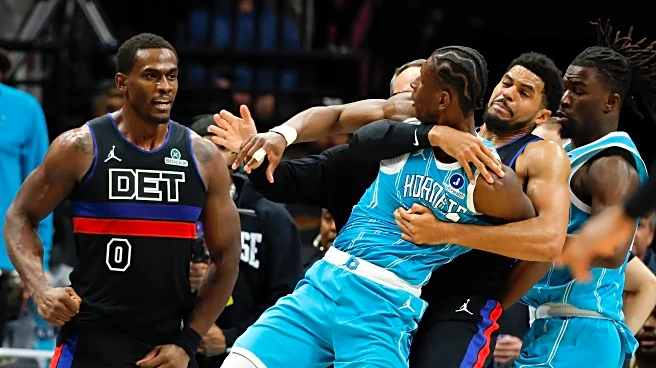What's Happening?
USC football team opened their season with a commanding 73-13 victory over Missouri State, marking their highest scoring game since 1930. The Trojans showcased their offensive prowess with nine players scoring touchdowns and accumulating 597 yards. This performance highlights USC's strategy of scheduling less challenging non-conference games, as they believe tougher opponents do not yield rewards from the CFP selection committee. The game provided valuable experience for young players, including freshman quarterback Husan Longstreet, who demonstrated his rushing capabilities. The team also saw impressive performances from players like Jayden Maiava and Kameryn Fountain, indicating potential for a strong season.
Why It's Important?
The decision by USC to schedule less challenging non-conference games could impact their standing with the CFP selection committee, potentially affecting their chances for playoff contention. This strategy may influence other teams to reconsider their scheduling practices, prioritizing easier wins over competitive matchups. The game also served as a platform for emerging talents, which could shape the team's dynamics and performance in future games. The emphasis on developing young players and refining strategies could lead to long-term benefits for USC's football program, enhancing their competitiveness in the league.
What's Next?
USC will continue to evaluate their non-conference scheduling strategy, balancing the need for competitive games with the desire for favorable outcomes. The team will focus on integrating young talents like Husan Longstreet into their lineup, potentially reshaping their offensive strategies. As the season progresses, USC will aim to maintain their momentum and address any weaknesses exposed during the opener. The upcoming games will test their ability to adapt and refine their approach, with the goal of securing a strong position in the league.
Beyond the Headlines
The broader implications of USC's scheduling strategy may extend to discussions on the fairness and competitiveness of college football scheduling practices. This approach could spark debates on the balance between securing wins and fostering competitive sportsmanship. Additionally, the development of young players like Husan Longstreet may influence recruitment strategies, emphasizing the importance of nurturing talent from early stages. The team's performance could also impact fan engagement and support, as successful games often boost morale and attendance.










